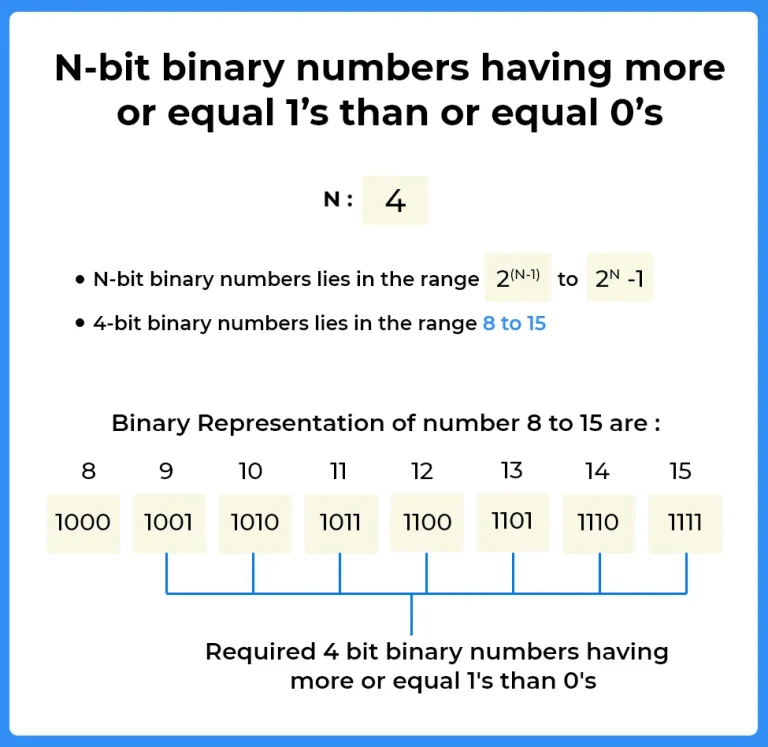Print N-bit binary numbers having more 1’s than 0’s in all prefixes in C++
N-bit binary numbers having more or equal 1’s than 0’s in C++
Here, in this page we will discuss the program to print n-bit binary numbers having more or equal 1’s than 0’s in C++ programming language. We are given with an integer value n, and need to print n-bit binary numbers.
Example :
- Input : 4
- Output : 1111 1110 1101 1100 1011 1010
- Explanation : 1111 1110 1101 1100 1011 1010 all these are the requied binary numbers.

Method 1 (Recursive Approach) :
In this method we use recursion. At each point in the recursion, we append 0 and 1 to the partially formed number and recur with one less digit.
- Create a recursive function say printRec(string number, int extraOnes, int remainingPlaces)
- Check if(remainingPlaces==0), if it is true then print number and return //Base condition
- Otherwise call the function by appending “1” i.e, printRec(number + “1”, extraOnes+1, remainingPlaces-1)
- Now, check if(extraOnes > 0),then call printRec(number+ “0”, extraOnes-1, remainingPlaces-1), i.e, by appending 0 to number.
Code to find N-bit binary numbers having more or equal 1's than 0's in C++
Run
#include <bits/stdc++.h>
using namespace std;
//Recursive function to print the required numbers
void printRec(string number, int extraOnes,int remainingPlaces)
{
if (remainingPlaces==0) {
cout << number << " "; return;
}
printRec(number + "1", extraOnes + 1, remainingPlaces - 1);
if (extraOnes > 0)
printRec(number + "0", extraOnes - 1,remainingPlaces - 1);
}
// Driver code
int main()
{
int n = 4;
string str = "";
printRec(str, 0, n);
return 0;
}
Output :
1111 1110 1101 1100 1011 1010
Method 2 (Using Non-Recursive Approach) :
In this method we will discuss the non-recursive approach to print the required binary numbers having more or equal1’s than 0’s.
- Declare two variables say first and last.
- Set first to 1<<(N-1) and last to first*2.
- Run a loop over the range i.e, last-1 to first.
- Now, quire only those which satisfies the condition (i.e, one_cnt >= zero_cnt)

Code in C++
Run
#include <bits/stdc++.h>
using namespace std;
// Function to get the binary representation
// of the number N
string getBinaryRep(int N, int num_of_bits)
{
string s = "";
num_of_bits--;
// loop for each bit
while (num_of_bits >= 0)
{
if (N & (1 << num_of_bits))
s.append("1");
else
s.append("0");
num_of_bits--;
}
return s;
}
vector <string> NBitBinary(int N)
{
vector <string> s;
int first = 1 << (N - 1);
int last = first * 2;
for (int i = last - 1; i >= first; --i)
{
int zero_cnt = 0;
int one_cnt = 0;
int t = i;
int num_of_bits = 0;
// longest prefix check
while (t)
{
if (t & 1)
one_cnt++;
else
zero_cnt++;
num_of_bits++;
t = t >> 1;
}
if (one_cnt >= zero_cnt)
{
// do sub-prefixes check
bool all_prefix_match = true;
int msk = (1 << num_of_bits) - 2;
int prefix_shift = 1;
while (msk)
{
int prefix = (msk & i) >> prefix_shift;
int prefix_one_cnt = 0;
int prefix_zero_cnt = 0;
while (prefix)
{
if (prefix & 1)
prefix_one_cnt++;
else
prefix_zero_cnt++;
prefix = prefix >> 1;
}
if (prefix_zero_cnt > prefix_one_cnt)
{
all_prefix_match = false;
break;
}
prefix_shift++;
msk = msk & (msk << 1);
}
if (all_prefix_match)
{
s.push_back(getBinaryRep(i, num_of_bits));
}
}
}
return s;
}
// Driver code
int main()
{
int n = 4;
vector <string>results = NBitBinary(n);
for (int i = 0; i < results.size(); ++i)
cout << results[i] << " ";
return 0;
}
Output :
1111 1110 1101 1100 1011 1010
Prime Course Trailer
Related Banners
Get PrepInsta Prime & get Access to all 200+ courses offered by PrepInsta in One Subscription
Login/Signup to comment




C++ code
#include
using namespace std;
//This function checks the no. of digits in an integer
int checkDigit(int x)
{
int count=1;
while(x/10!=0){
x=x/10;
count++;
}
return count;
}
//This function checks whether a number is binary or not
bool checkBinary(int a)
{
while(a!=0)
{
int y=a%10;
if(y!=0&&y!=1)
return false;
a=a/10;
}
return true;
}
//This function calculates the no. of zeroes and ones in an integer
bool countOne(int a)
{
int count1=0;
int count0=0;
while(a!=0)
{
int y=a%10;
if(y==1)
count1++;
else
count0++;
a=a/10;
}
if(count1>=count0)
return true;
else
return false;
}
//This function checks the balancing of ones and zeroes in prefix of the string
bool countOneinPrefix(int a)
{
while(a!=0)
{
if(countOne(a))
{
a=a/10;
countOneinPrefix(a);
}
else{
return false;
}
}
return true;
}
//The driver function
int main()
{
int x;
string s2;
cout<>x;
for(int i=0;i<x;i++)
s2 = s2 + "1";
int num2 = stoi(s2);
for(int i=0;i<=num2;i++)
{
if(checkDigit(i)==x)
{
if(checkBinary(i)){
if(countOneinPrefix(i))
cout<<i<<endl;
}
}
}
return 0;
}